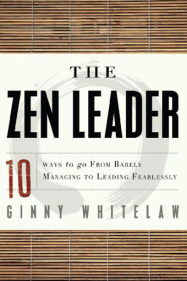 Nothing seems to run in a straight line. We start something, move things forward and then the backslide begins. Whoever penned the phrase, "two steps forward and one step back" understood the pattern of growth - something we can see in everything from our personal relationships to leadership development. I guess I always thought that knowledge and learning were more linear - and preferably ascending at a 45 degree angle:-) Silly me! Learning advances in stages, with sometimes numerous setbacks along the way. Unfortunately, many people give up after the first one or two. Why? Because it feels too much like failure and we take it personally. Don't confuse failure with the normal forward and backward motion of growth.
Nothing seems to run in a straight line. We start something, move things forward and then the backslide begins. Whoever penned the phrase, "two steps forward and one step back" understood the pattern of growth - something we can see in everything from our personal relationships to leadership development. I guess I always thought that knowledge and learning were more linear - and preferably ascending at a 45 degree angle:-) Silly me! Learning advances in stages, with sometimes numerous setbacks along the way. Unfortunately, many people give up after the first one or two. Why? Because it feels too much like failure and we take it personally. Don't confuse failure with the normal forward and backward motion of growth.How do you react to the first setback when working toward a goal?
It's so easy to take things personally when setbacks occur. What don't people like about my goal? Why aren't they on board with me? What did I not take into account? These simple questions, while varied in their answers, all have a common denominator - me, my, I. When we can make the "flip" from It's All About Me, to I'm All About It, we gain freedom, energy and the ability to move forward for the greater good.
The many faces of It's All About Me
No leaders I know think "it's all about me." "And yet," as Ginny Whitelaw states it in the book, The Zen Leader, "The need to meet our own needs is deeply human and doesn't disappear the moment we start caring about others or connect ourselves to causes." Take a look at a few of the phrases she's heard during her coaching career from high-flying, highly skilled leaders who indeed care about the people around them, and see if any of these ring true for you:
- Only I can do this (fast enough, correct enough, and so on)
- I (or my team) want credit for this
- I'm worried about money
- It bothers me that my peers don't like me
- I need to be heard (or respected, or promoted, etc)
- I'm burning out; I work too hard
- If our groups get merged, I may be out of a job.
Maslow recognized human needs and gave us a simple way to understand how they build on one another in his hierarchy of needs. But we don't scale this hierarchy only once in a simple linear fashion. Instead, we go back and forth - "down to the physical level when we are hungry and up to the self-actualization level when we are doing our best work," adds Ginny. When we map the faces of It's All About Me into Maslow's hierarchy, we begin to see the root need that is trying to be met. For example:
- Only I can do this -> self-esteem, personal power
- I'm worried about money -> security
- I'm burning out; I work too hard -> physical
- It bothers me that my peers don't like me -> affiliation
Awareness opens more doors
Why is it important to map this out? Because when we discover the underlying fear/need that is not being met, we become aware of where we tend to get stuck in Maslow's hierarchy. "Really understanding how our needs function, not as a judgment against ourselves but with curious exploration, moves them from being faces in disguise to faces we recognize," Ginny further explains. Awareness gives us the ability to see those needs and the freedom to choose beyond them for the greater good.
Making the flip from It's All About Me to I'm All About It
When we can invert our way of thinking from a self-serving focus to one that focuses on serving, we are ready and fully capable of moving ourselves and others forward again with our goals. Let's take those same I-centered statements and see what they look like after making this eighth flip from The Zen Leader:
- Only I can do this -> I'd enjoy doing this but who else can learn from this?
- I'm worried about money -> I can be prudent about money and resourceful about living with just enough if I have to.
- If our groups get merged, I may be out of a job -> Our groups merging may signal that it's time for a new chapter for me.
- It bothers me that my peers don't like me -> even if Jane doesn't like me I'm going to help her anyway.
Just because we now understand the pattern of growth that moves backward several times along the way doesn't mean we want to linger there when it happens. We can listen to the voice of resistance and become aware of the fear/need it is trying to protect and then ask ourselves, "If I could take my need out of it, how could I become All About It?" It's nothing more than listening, learning and getting out of our own way. Adjustments and decisions we make based on the whole picture are always better.
"When we work with a true steward, one who is creating a more valuable world for the sake of others, it brings out the best in us and we get bigger. When a great leader like President Kennedy reminds a nation 'Ask not what your country can do for you; ask what you can do for your country.' he pulls people up Maslow's hierarchy toward a greater sense of who they can be in service to others, By contrast, the politician who promises it's all about you, and that he'll go to the Capital to 'bring back your money,' draws people down into angry selfishness. As leaders we are not only tending to our own hierarchy of needs, but inspiring (or dragging) others up (or down) Maslow's hierarchy as well. As we draw more people up toward their self-actualizating potential, we see more creativity, agility, spontaneity, and broad-based thinking, and less fear," states Ginny. And nothing draws people to a leader more than when they feel inspired to be their best self. Why lead people anywhere else?



 The Swedes have a great word for this: Lagom, which roughly translates as "enough, sufficient, or just right." Too often, in today's world of avid consumerism, we get caught in a "good, better, best" way of thinking and find ourselves applying that principle to all aspects of our lives, including leadership. Our tendency to overdo can lead to "leadership obesity" which manifests in many undesirable ways: the ultimate problem-solver who fails to empower their employees, or the achievement-driven leader who drives for success at all costs. "Just as we don't serve ourselves well from overeating, we do ourselves no favor by over-indulging these needs," states Ginny Whitelaw, in
The Swedes have a great word for this: Lagom, which roughly translates as "enough, sufficient, or just right." Too often, in today's world of avid consumerism, we get caught in a "good, better, best" way of thinking and find ourselves applying that principle to all aspects of our lives, including leadership. Our tendency to overdo can lead to "leadership obesity" which manifests in many undesirable ways: the ultimate problem-solver who fails to empower their employees, or the achievement-driven leader who drives for success at all costs. "Just as we don't serve ourselves well from overeating, we do ourselves no favor by over-indulging these needs," states Ginny Whitelaw, in 




